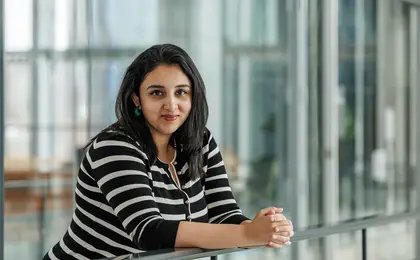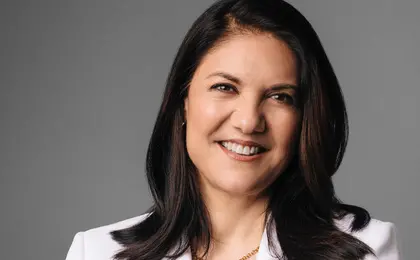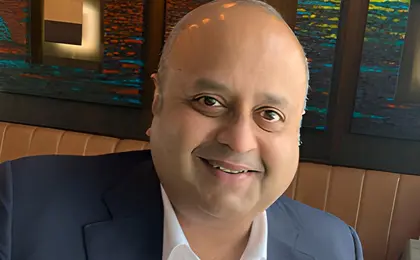
Eddie Thai ’12
MBA
General Partner, Ascend Vietnam Ventures
By Rebecca Beyer
While Eddie Thai ’12 was interning in Vietnam as an MBA student, the aspiring venture capitalist wrote down a prediction: the startup scene in Vietnam wasn’t quite ready yet, but it would someday be a major investment destination.
“There wasn’t an ecosystem,” he recalls. “It was individual entrepreneurs operating largely independently with very little resources or cross-collaboration.”
That’s changing, in part because of funds like Ascend Vietnam Ventures (AVV), a new firm launched earlier this year by Thai and his co-founder, Binh Tran, that aims to invest in internationally iconic companies arising from Vietnam. AVV follows on the success Thai and Tran have had at a Vietnam-focused fund of the global venture capital firm 500 Startups. By early 2021, Thai and Tran had invested the $14 million fund into 76 companies working across fintech, ecommerce, logistics, edtech, and other areas. Two of those companies are already valued at more than $1 billion.
For Thai, who grew up in Florida, venture capital is a means to an end he’s been pursuing since he was a child: impact. Thai’s parents immigrated to the United States from Vietnam in the 1970s. His father left the country to earn a doctorate in public administration with plans to return to South Vietnam after he finished. That wasn’t possible; by the time he finished his degree, “the country was no longer there,” Thai says. Thai’s mother, a flight attendant for South Vietnam’s flag carrier, managed to get on a plane out of the city then known as Saigon to reunite with her husband just before the fall of the city.
“When I was 10, I found the airplane ticket that my mother had used to get to the United States. It was mid-April 1975, two weeks away from what we recently saw in Afghanistan,” with mass evacuations and people crowding the airport desperate to leave, Thai says. “If my mother didn’t hustle to get out, my life would have been completely different. That gave me a sense of appreciation and obligation to earn my place in the life I was given.”
Thai’s parents wanted him to be a doctor, but Thai felt he could make a greater impact in another field. He attended Harvard University, where he studied government and economics with the idea of going into policy. (“While doctors help one person at a time, public health officials can help many, many people at once,” he says.) After graduating, he took a job as a management consultant to get experience and expand his network. He spent three years working with clients ranging from a startup to larger, more established companies before deciding it was time to move on.
“The point wasn’t to stay in consulting, but to learn and take the next step,” he says.
By then, his mind was already on Vietnam, which he had visited as a teenager.
“Even as a teenager, I could see the dynamism and the energy,” he recalls. “I knew: This is a place I want to come back to.”
Thai was also beginning to think about entrepreneurship. His father worked as a professor for more than 40 years, but he and Thai’s mother were also entrepreneurs, running a restaurant, investing in low-income housing, and doing other things to establish their own family and help other relatives settle in the United States.
“That was really transformational to see,” Thai explains. “I wondered if starting companies in Vietnam could have a similar kind of impact.”
Thai spent a month traveling around the country before deciding to go to business school to explore how he might pursue opportunities there or in Southeast Asia more broadly. Yale SOM stood out for its focus on public impact, he says. While at Yale, Thai organized an International Experience trip to Vietnam and received an emerging markets internship grant to work at a private equity firm during the summer after his first year.
“Overall, my approach to returning to Vietnam was not, ‘let me jump into the deep end,’ but, “‘let me get in the water gradually,’” he laughs.
At Yale SOM, Thai says, he learned many of the guiding principles he now uses to run his own venture capital firm, including a focus on the people and culture that make up a company. He says his favorite class at SOM was a course on private equity and venture capital taught by the late David M. Cromwell. He also enjoyed classes on advanced negotiation with Daylian Cain and venture capital strategy with former faculty member Olav Sorenson, the latter of which gave him a chance to meet Yale College alum Bill Draper ’50, co-founder of marquee venture capital firm Sutter Hill.
After graduating, Thai worked for a South Korean media company for a few years before joining 500 Startups, where he and Tran first worked together.
“The question was, ‘Should I start a company myself or help other entrepreneurs?’” he remembers.
Thai ultimately decided he could have greater impact as an investor.
“I have immense respect for people who start companies,” he says. “I think that’s real bravery, especially in an emerging market like Vietnam.”
At 500 Startups, Thai’s successes include investments in Axie Infinity, an NFT gaming company that counts among its cofounders Yale College alum Jeff Zirlin ’15, and ApplyBoard, which connects international students with academic institutions to facilitate the study abroad process. Both companies recently reached unicorn status with valuations of $1 billion or more. Another portfolio company is Trusting Social, a fintech startup leveraging data to enable financial inclusion to the underbanked across Vietnam, Indonesia, India, and the Philippines.
Thai and Tran decided to start AVV this year after taking stock of their work with 500 Startups Vietnam.
“We said, ‘Are we having fun? Are we doing a good job? Are there still opportunities in the market?’” he says. “And the answer to all those questions was ‘yes.’”
AVV focuses on seed-stage investments in technology-driven, capital-efficient endeavors addressing universal human needs like financial inclusion, education, and work, among others.
“The impact these companies make, and the returns we can get for that—that’s exciting,” he says. “Seed stage is the earliest stage of an entrepreneur’s journey. It’s the most difficult and most transformative time, and that’s where we most enjoy finding founders and providing them support.”
Thai, who lives in Ho Chi Minh City, continues to be an active member of the Yale SOM community, serving, among other roles, on the Alumni Advisory Board. He says that’s just one more way he measures his impact.
“SOM was very clearly part of my journey,” he says. “The place I was given at SOM and elsewhere could have been given to someone else. I want to retroactively earn that place and help others.”
Interviewed on September 8, 2021
Related Profiles

Shreya Arora ’25

Mary Ellen Iskenderian ’86

